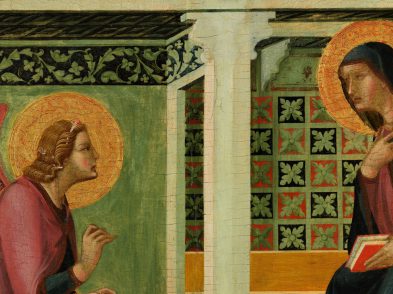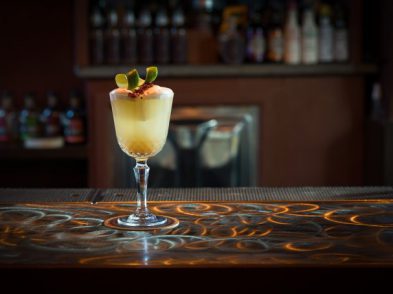
Weinberg performing at the Cortona Mix Festival
“The screen door slams, Mary’s dress sways, Like a vision she dances across the porch as the radio plays…”
I’ve written for The Florentine about hot New Jersey summers (n.164/2012), but never thought that some of the Garden State heat would come to Cortona. This year it came in full force, both literally and metaphorically. And with it came the music of Max Weinberg, drummer for Bruce Springsteen’s E Street Band and band leader on Conan O’Brien’s late night show. Max and I talked about our shared Jersey roots, the Boss, family, Tuscany, and–of course –food. What surprised me most about the man was his steady manner and moderation, ideal for the engine of the band. But where was the flirt? The poetry of summer nights? While Max seemed less hip and more hip replacement, our conversation shows how steady work, even in the sexy world of rock music, brings results. His masterful drumming skills were confirmed in a tour de force concert at Cortona Teatro Signorelli, where he played bebop jazz greats, highlighting the talents of his bandmembers and concluding the 2015 Mix Festival.
Oonagh Stransky: First of all, as a Jersey girl, I want to say thank you for being here. Both my parents grew up in northern New Jersey and my grandfather’s family first came to Jersey City in the late 1800s. I lived there when I was young, then when we moved abroad, I came back every summer, swimming in the lakes and rivers of the then-unspoiled countryside, taking the Erie Lackawanna in to NYC, riding horses. After graduating from high school I spent a summer in Seaside Heights making cheesesteaks on the boardwalk, working and watching people, exploring the coastline, and falling in love. Tell me: what does New Jersey represent for you today?
Max Weinberg: New Jersey is home. I live in New Jersey but I have a home here, too. New Jersey is where I learned how to play music; it’s one of those hardscrabble states that Frank Sinatra made it OK to be from, and that later in the ’70s and ’80s Bruce Springsteen helped along.
OS: I read that when you play with Bruce there’s no setlist: you have to be ready to play anything with just a few chords’ notice. What does that feel like?
MW: It feels normal and natural. After 41 years playing with him, when he goes in one direction, the training is to go with him. Generally we are pretty good at it. Everyone plays close attention. For example, if we do a concert with 25 songs, maybe 12 of those songs could be different from what he wrote down an hour before. You’ve got to really keep your eyes and ears on him.
OS: What is it that makes him change his mind?
MW: A feeling he has for the audience. Sometimes he responds to requests – people at our concerts hold up signs. It’s just how he’s working the audience and what is happening that night. He keeps things – and I have learned how to do this from him – absolutely in the moment. And that’s a very important, and very rare, ability. At a lot of rock shows you’ll actually see the same show every night. With Bruce Springsteen and the E Street Band you never know what you’re going to hear, which lends a bit of unpredictability, which in rock n’ roll is excitement. It’s a thrill when you get it right. And when you don’t get it right, you try your best to get it right. It lends a spontaneity to it.
OS: What do you do before a concert to get into the zone?
MW: Actually, it doesn’t take very much. If it’s an 8 o’clock show, at about 6 o’clock I’ll have a light dinner, I may lay down for ten minutes, then about 45 minutes before the show’s scheduled start (it may start later depending on how the crowd comes in), I warm up on a drum pad. I’ll get my hands warmed up by playing exercises, then I’ll get dressed and we’ll go play. I try to get a lot of sleep. It’s very important when I’m on tour that I get as much sleep as possible and eat right because 4-hour shows are very grueling.
OS: Top three concerts that you’ve ever played?
MW: I remember playing in Milan and Florence in the pouring rain. It was an absolute car wash! I remember playing in Berlin before the Wall came down, in East Berlin in a park. That was extremely memorable. Opening the Meadowlands in New Jersey in 1981 – I had just gotten married the week before. That was the first time a rock band played in that venue. Playing six nights at Giants Stadium – things like that. The first night I played with Bruce and the E Street Band in a club outside Philadelphia called the Main Point, two weeks after I met them. Those were great times, it was great fun.
OS: You mentioned eating dinner…it wouldn’t be an article for The Florentine if it didn’t mention food: do you enjoy Italian cuisine?
MW: Of course, but it’s difficult for me because I really do watch what I eat. This means I eat everything I want, but not a lot of it. I stay away from sweets, I don’t have any bread, I can have pasta occasionally.
OS: Do you cook?
MW: No! My wife is a wonderful cook. My wife and daughter studied cooking in Lucca for a month about 12 years ago and they both came back wonderful cooks. I’m the beneficiary. No, I don’t cook. I like to eat but at my age I am geared towards staying trim and in good shape. It gets harder. And playing the drums is physical so I’ve got to stay as light as possible.
OS: My daughter plays the drums. What advice would you give a young drummer?
MW: Always warm up and keep strict time. Be steady. My son is a young drummer, a wonderful drummer. He plays in the band Slipknot. They played in Rome and Milan recently. The only bit of advice I gave him was keep steady time and don’t grip the sticks tightly. And he’s followed both those bits of advice, not from his dad, but from his dad who happens to be a drummer. I would also say that if you’re learning how to drum, just try to maintain your interest in the drums, and don’t get frustrated, because it is frustrating to learn how to do anything new, particularly when you’re an adult! Stay in touch with what made you want to do it in the first place – in my case it was simply enabling people to get up and dance. That was very important to me.
OS: This quote has been attributed to you: “The world needs more drummers and less lawyers.”
MW: Yes, I went to law school for about 6 weeks before starting to play with Dave Edmonds in 1990 for a small tour, and I left because I realized that I was taking someone’s play at school that wanted and needed to be a lawyer. It was a bit of a facetious remark but it was a play on a phrase that I heard in relation to the atomic bomb: that it would be wonderful to have more scientists who read Shakespeare.
OS: Politics? Chris Christie?
MW: I try to stay away from political discussions. I did a lot of campaigning for John Kerry who I believed in very strongly and still do. I tend to respond to individuals and their beliefs. I think the world seriously needs attention, every part of the world. And I think my basic political posture is “what a shame the human race did this to earth.” What we have done environmentally, politically, culturally. The planet Earth is such a gift. There are broken systems all over, not just in the United States, all over the planet.
OS: You mentioned you have a home here. Any plans to settle here? Get a winery? Make some “Max Wine-berg?”
MW: We come over here as often as we can. We love it over here. My wife was born in Heidelberg, Germany – her father was a career Army officer. She has a tremendous, intrinsic affection for Europe, always has. Most of my work is in the US though, so it would be hard to live here full time. But it’s an ideal place, especially this area of Italy, the heart of Tuscany. I usually fly into Rome, and as soon as I make that drive from Rome up the A1 and get off at Val di Chiana and start driving through the valleys, I get that feeling that people get when they come here. And after two or three days, everything starts to slow down a little bit. You appreciate things. For example, this morning I took a walk through the park here, as we do when we come to Cortona, and it was absolutely silent except for the sound of the cicadas, and you hear the music that they’re making…that doesn’t happen in NYC.
OS: No, it doesn’t, but you hear them in New Jersey, or at least I did when I was a kid.
MW: Yeah, New Jersey summers are great when you’re a kid, but not so much as an adult. There’s more traffic, weird weather patterns. What I like about here is the quality of the light, the air, probably because it’s more agricultural, like the area of New Jersey you came from.
OS: Tell me about the Cortona Mix Festival. It’s your third year here…
MW: The people who put on the festival, including Lorenzo, are the hardest working people I have ever seen. They are tireless, they are extraordinarily organized, and they make it very easy for someone to just come in and play. The first year I was here I played with a local group of musicians we called the Cortona All-Stars. This time I brought a band over because I am playing in several other cities this week: L’Aquila, Milan, Savona, Brisighella, with a break in the middle to go back to New York to play for one night. They do an amazing job here, they get an amazing turnout, with the festival’s mix of culture and politics, music, and art.
OS: Nina Zilli is going to be playing with you. I love her voice. Have you met her yet?
MW: No, I haven’t. But it will be fun. You know in the jazz vein you don’t need to practice beforehand but we will meet up tomorrow.
OS: Do you sing ever? What do you think of singer-drummers?
MW: No, I don’t sing. When I think of singing drummers I think of Levon Helm from The Band, and Phil Collins of course in the rock vein. There haven’t been too many instrumentalists who also sing. The drummer of the song Wipeout was also a singer. Someone like Phil Collins took the roll of simply being the drummer (unlike Dave Grohl who plays several instruments) to being the singer, songwriter, and front man. He went into the stratosphere with his ability. I don’t know whether he knew he had that ability but talk about someone who just expanded…
OS: Tell me about growing up with Bruce Springsteen.
MW: I’ve grown with him – I started when I was 23 and now I am 64, so there has been a lot of growth. You learn how to play music together, you grow together, then you learn how to play music better together.
OS: I know you had some injuries on your wrist a while back. Is this a typical injury for drummers?
MW: Yeah, I had tendonitis. It wasn’t so typical of drumming but of bad technique. I gripped too hard, played, long shows, played as if there really was a forever. That’s common of people in their 20’s. You get a little older and you realize that life is finite, so you don’t take as many chances. I was reckless with my drum technique, but it was a long time ago, and I don’t have any issues with that now.
OS: Any final words about your art?
MW: Well, as with any art, you create it out of something that isn’t there. It’s very architectural. It’s the architecture of whatever piece of music I’m playing. I think the whole idea of drumming is to allow other people around you to more easily express themselves. Bernard Purdie used to say that a drummer is “a helping musician,” that he helps the other musicians, and that’s the way I approach it. I want to help everyone express themselves the best way they can, and give them a white line down the center of the road.

The author and Weinberg








